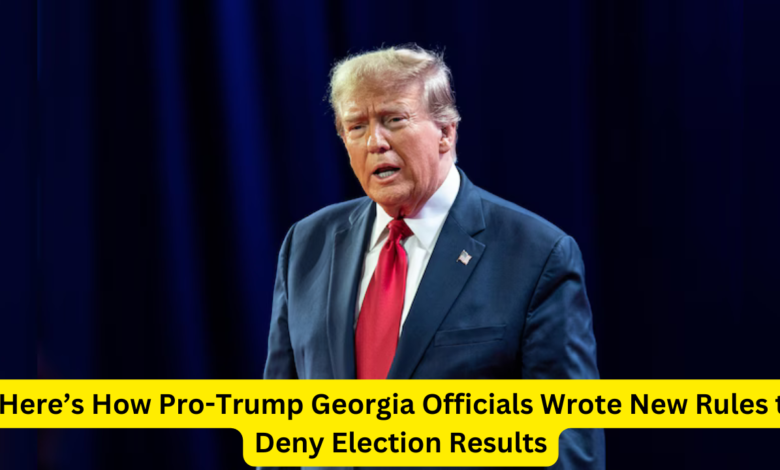Here’s How Pro Trump Georgia Officials Wrote New Rules to Deny Election Results

Here’s How Pro Trump Georgia Officials Wrote New Rules to Deny Election Results, In the complex landscape of U.S. politics, the 2020 presidential election remains a pivotal event that continues to shape discussions around election integrity and political influence. Pro-Trump Georgia officials played a significant role in this narrative by implementing new rules designed to challenge the validity of election results. This article delves into how these rules were crafted, their implications, and the broader context of their impact on election processes.
The Genesis of New Rules in Georgia
The 2020 election saw unprecedented levels of scrutiny and controversy. In Georgia, a key battleground state, pro-Trump officials pushed for significant changes to the state’s election procedures. These changes aimed to address alleged irregularities and voter fraud, though critics argue they were more about casting doubt on the election results than addressing any genuine issues.
The Role of Pro Trump Georgia Officialss
Pro-Trump officials in Georgia, including state legislators and local election officials, were instrumental in the development of these new rules. Their actions were driven by a strong allegiance to former President Donald Trump and a belief that the election had been undermined by widespread fraud. This belief, although widely disputed by election experts and courts, fueled a series of legislative and administrative changes.
Legislative Actions
In the wake of the 2020 election, Georgia lawmakers introduced several bills aimed at overhauling the state’s election procedures. These bills were designed to address perceived vulnerabilities in the voting system, such as absentee ballot processes and voter identification requirements. The proposed changes included:
- Increased Voter ID Requirements: Strengthening the identification requirements for absentee ballots and in-person voting.
- Restrictions on Drop Boxes: Limiting the use and availability of drop boxes for absentee ballots.
- Enhanced Election Monitoring: Expanding the role of partisan poll watchers to ensure greater oversight of the voting process.
These legislative efforts were justified by proponents as necessary measures to ensure the integrity of elections, while opponents viewed them as efforts to disenfranchise voters and undermine the election results.
Administrative Changes
In addition to legislative actions, pro-Trump officials also pursued administrative changes to the election process. These changes included:
- Revised Certification Procedures: Altering the process for certifying election results, which created additional hurdles for finalizing the vote count.
- Increased Scrutiny of Voting Machines: Implementing stricter protocols for the handling and security of voting machines.
These administrative changes were implemented under the guise of improving election security but were seen by many as obstacles to a fair and transparent electoral process.
The Impact on Election Integrity
The introduction of these new rules in Georgia had a profound impact on the state’s election processes. Critics argue that these measures undermined trust in the electoral system and created unnecessary barriers for voters. For instance:
- Voter Suppression Concerns: The increased voter ID requirements and limitations on drop boxes were perceived as efforts to suppress voter turnout, particularly among marginalized communities.
- Challenges to Election Results: The changes to certification procedures and increased scrutiny of voting machines contributed to ongoing disputes about the legitimacy of the election results.
These impacts are part of a broader trend of similar efforts in various states, reflecting a contentious debate over election integrity and political influence.
Broader Implications and Controversies
The actions of pro-Trump officials in Georgia are not isolated incidents but part of a broader national conversation about election integrity. The debate centers around several key issues:
Election Integrity vs. Voter Access
The balance between ensuring election integrity and protecting voter access is a central theme in this debate. Proponents of stricter election rules argue that these measures are necessary to prevent fraud and ensure fair elections. Critics, however, contend that these measures disproportionately affect certain groups of voters and undermine the democratic process.
Legal and Political Repercussions
The new rules in Georgia have also led to legal challenges and political backlash. Lawsuits were filed arguing that the changes violated constitutional rights and were implemented with partisan motives. The legal outcomes of these challenges will likely have significant implications for future elections and the broader political landscape.
Public Perception and Trust
Public perception of the fairness and integrity of elections is crucial for maintaining democratic norms. The changes in Georgia and similar efforts in other states have contributed to a growing distrust in the electoral system. This distrust can have far-reaching consequences for political stability and civic engagement.
Conclusion: Reflecting on the Impact
The new rules introduced by pro-Trump officials in Georgia represent a significant shift in the state’s election landscape. While intended to address concerns about election integrity, these measures have sparked controversy and raised important questions about the balance between securing elections and ensuring voter access. As the debate continues, it is essential to consider the broader implications of these changes for the democratic process and public trust in elections.
How do you think the changes in Georgia’s election rules will impact future elections and voter trust? Share your thoughts and insights in the comments below.





One Comment